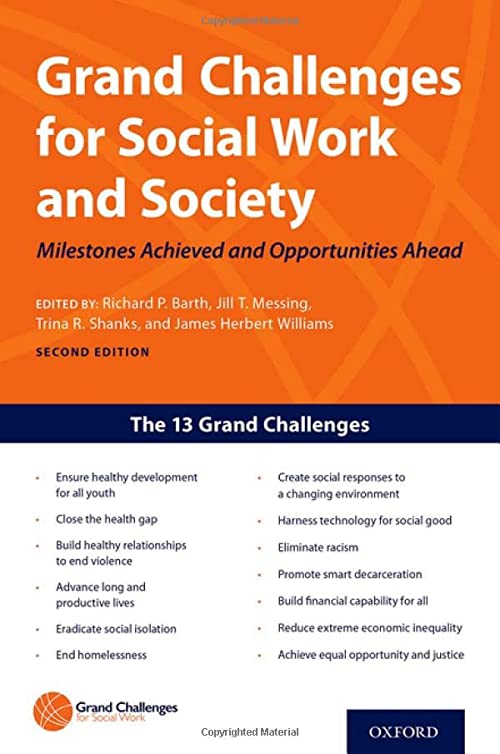
Richard P. Barth, PhD, MSW, professor and chair, Executive Committee of the Grand Challenges for Social Work, University of Maryland School of Social Work. “Grand Challenges for Social Work and Society,” Second Edition (Oxford University Press, 2022).
The Grand Challenges for Social Work Initiative (GCSWI), which is spearheaded by the American Academy of Social Work and Social Welfare, represents a major endeavor for the entire field of social work. GCSWI calls for bold innovation and collective action powered by proven and evolving scientific interventions to address critical social issues facing society. GCSWI aims to identify and find solutions for some of the most persistent social issues, tackling problems such as homelessness, social isolation, mass incarceration, family violence, and economic inequality. “Grand Challenges for Social Work and Society” presents the foundations of GCSWI, laying out the start of the initiative and providing summaries of each of the 12 challenges. The 13 main chapters that form the core of the book are written by the primary research teams that are driving each project. The second edition includes updates on the initiatives laid out in the first edition and sets new goals for the next five years. It also includes new information on the Grand Challenge to Eliminate Racism, expanding the social work pipeline, commentaries from leading social work organizations, and how interdisciplinary science can best provide a platform to tackle society’s most urgent problems.
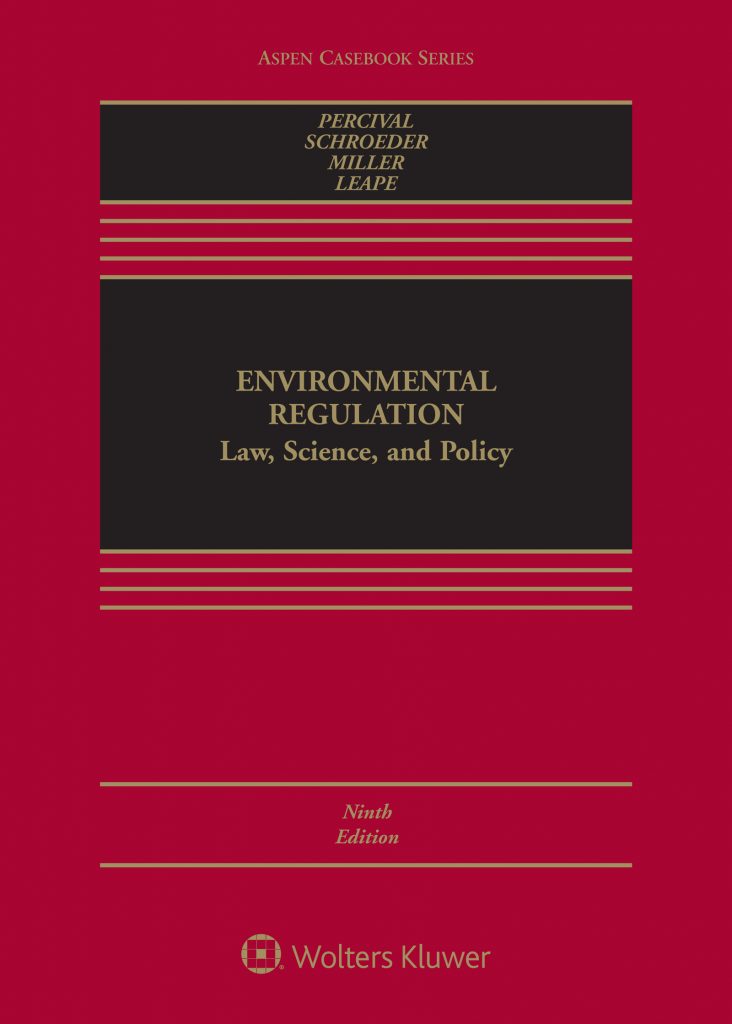
Robert V. Percival, JD, MA, Robert F. Stanton Professor of Law and director, Environmental Law Program, University of Maryland Francis King Carey School of Law. “Environmental Regulation: Law, Science, and Policy,” Ninth Edition (Aspen Publishing, 2021).
“Environmental Regulation: Law, Science, and Policy” demystifies the complexity of environmental law. It provides up-to-date, comprehensive, and accessible coverage of this rapidly changing field. After exploring the causes of environmental problems and the moral values they implicate, the casebook provides a structural overview of the regulatory system. It considers how environmental law seeks to protect public health and the environment from climate change, toxic chemicals, hazardous wastes, and air and water pollution. This casebook covers land use regulation, protection of biodiversity, environmental impact assessment, environmental enforcement, and international environmental law.
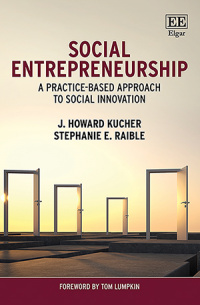
J. Howard Kucher, DPA, program director, MS in Health and Social Innovation, University of Maryland Graduate School. “Social Entrepreneurship: A Practice-Based Approach to Social Innovation” (Edward Elgar Publishing, 2022).
This accessible textbook provides a comprehensive guide to the building blocks of sustainable social enterprise, exploring how core elements contribute to the success or failure of the social venture. It analyzes the key skills needed to synthesize effective business practices with effective social innovation and points out what works and what does not. Taking a practical approach, it demonstrates how big ideas can be transformed into entities that produce lasting change. Making the case that social entrepreneurship may be the most effective way to bring about positive changes in society, this textbook will be an essential resource for introductory courses and electives in social entrepreneurship.
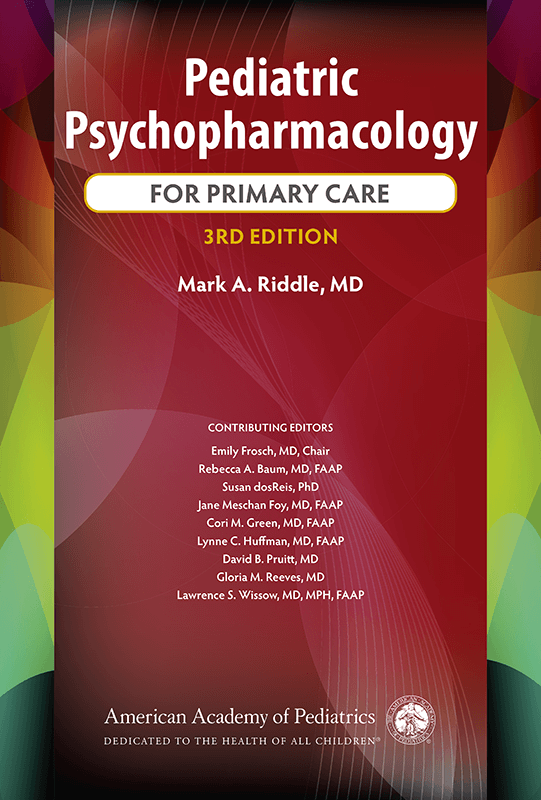
Susan dosReis, PhD, vice chair for research, Department of Pharmaceutical Health Services Research, University of Maryland School of Pharmacy. Consultant editor for “Pediatric Psychopharmacology for Primary Care,” Third Edition (American Academy of Pediatrics, 2021).
The updated and revised edition of this best-selling resource provides primary care physicians with practice-tested, condition-specific treatment recommendations for various mental and psychiatric disorders or behavioral problems in children and adolescents. It includes clear guidance on dosing, monitoring, and potential adverse reactions of psychotropic medications and will help ease medication decision-making with a clear, straightforward methodology based on current research and clinical experience. This simple, systematic approach defines discrete levels of psychotropics and describes their group-specific roles and responsibilities in accordance with American Academy of Pediatrics policies. The accompanying digital tool offers instant access to authoritative answers on specific conditions and psychotropic medications.

Vasken Dilsizian, MD, professor, Department of Diagnostic Radiology and Nuclear Medicine, University of Maryland School of Medicine, “Atlas of Nuclear Cardiology,” Fifth Edition (Springer, 2021).
This edition presents clinical data, image acquisition, and interpretation of nuclear cardiology procedures through high-quality illustrative image examples. It includes up-to-date and comprehensive coverage of advances in instrumentation, radiotracers, protocols, and clinical studies. New content includes indications in imaging cardiac sarcoidosis, amyloidosis, and device infections as well as recent advances in instrumentation (Hybrid PET/MR). It also provides fresh chapters on the history of nuclear cardiology imaging, radionuclide handling techniques and radiation safety, PET-based myocardial perfusion imaging, and vascular imaging. It is an essential reference for cardiologists, radiologists, and nuclear medicine physicians interested in the latest approaches to noninvasive diagnostic cardiovascular nuclear imaging techniques. It also serves as a ready reference textbook for medical students and residents as well as nuclear physicists, nuclear medicine technologists, and radiopharmacists.
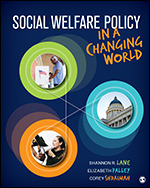
Corey S. Shdaimah, PhD, Daniel Thursz Distinguished Professor of Social Justice, University of Maryland School of Social Work, “Social Welfare Policy in a Changing World” (SAGE Publishing, 2020).
This approachable and reader-friendly text links policy and practice and employs a critical analytic lens to social welfare policy in the United States. With particular attention to disparities based on class, race/ethnicity, ability, sexual orientation, and gender, the authors assess the impact of policies at the micro, meso, and macro levels. The authors provide readers with a brief foundation in history, policy process, and theory, while primarily focusing on helping readers recognize the many ways that policy affects their lives and the lives of their clients and communities. Connecting description, theoretical analysis, and advocacy, this new text challenges readers to examine the development, consequences, and future implications of core policies. Readers will come away with a newfound understanding of how to use the political process to address social justice issues and enact meaningful policy change.

John Cagle, PhD, associate professor, University of Maryland School of Social Work. “The Oxford Textbook of Palliative Social Work,” Second Edition (Oxford University Press, 2022).
This comprehensive, evidence-informed text provides clinicians, researchers, policymakers, and academics with a broad range of content to inform and enhance palliative social work practice. This resource brings together more than 150 international authors and is edited by three leading palliative social work pioneers to address the needs of professionals providing interprofessional, culturally sensitive, biopsychosocial-spiritual care for patients and families living with serious illness. Social workers from diverse settings will benefit from the historical perspective and international scope as well as the wealth of patient and family narratives. This edition includes additional chapters that reflect the increased integration of palliative social work across populations, diagnoses, and settings. A new preface highlights aspects of social-political inequity and injustice that informed the development, process, and ultimate content of this text. International palliative social work practice is reflected by regional voices and highlighted by an exploration of the unique response to the COVID-19 pandemic as it evolved in their respective countries.



